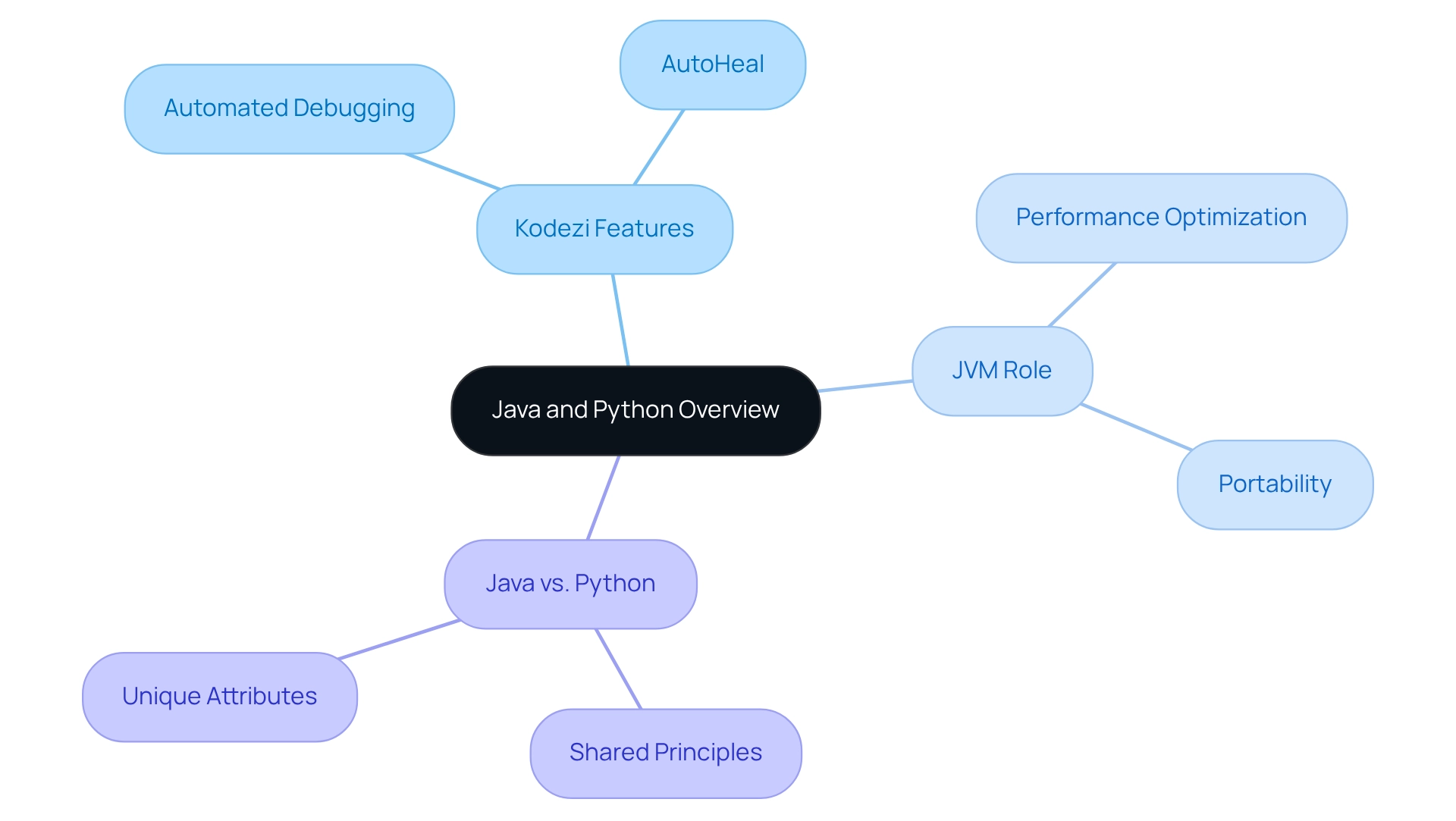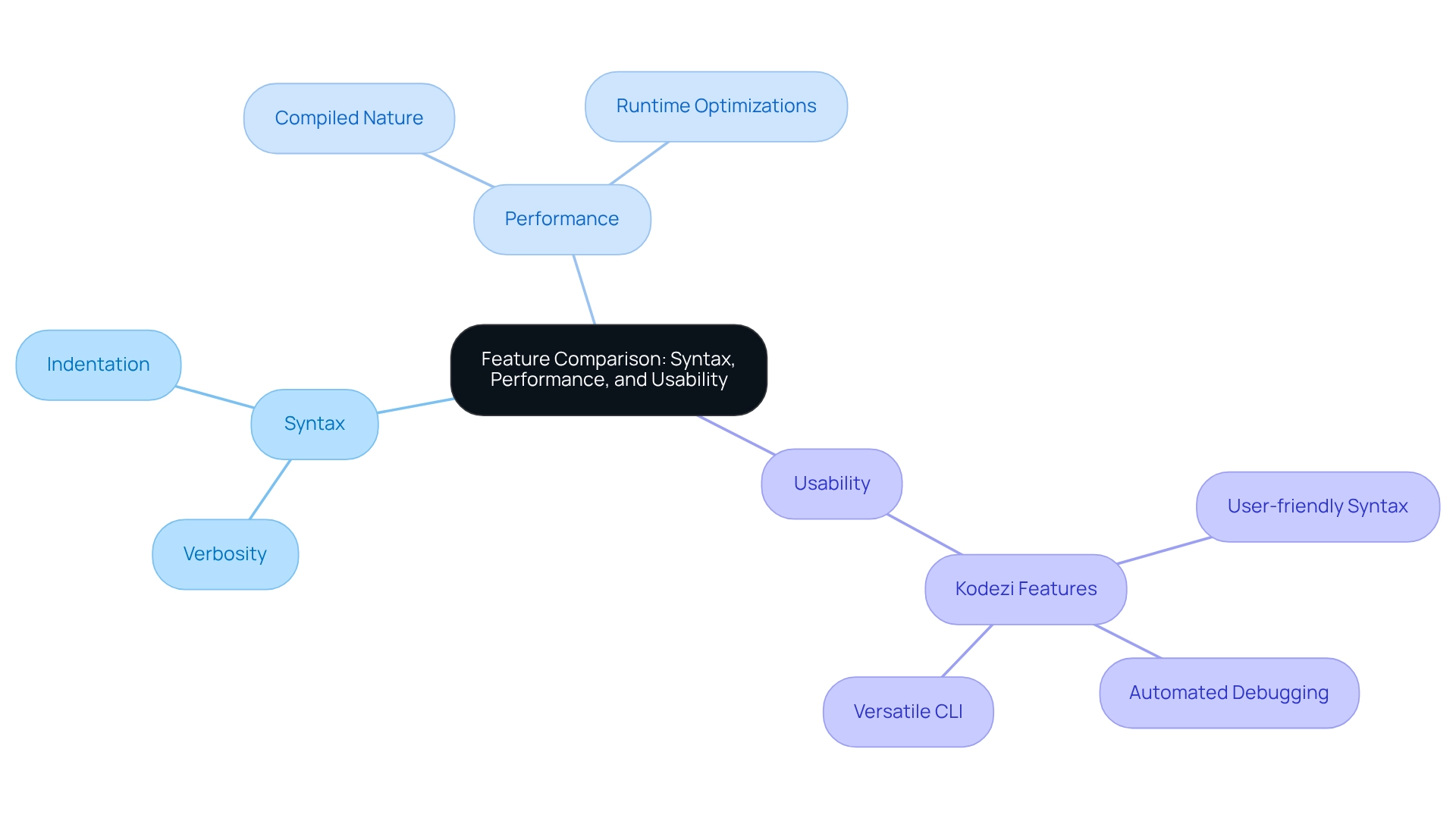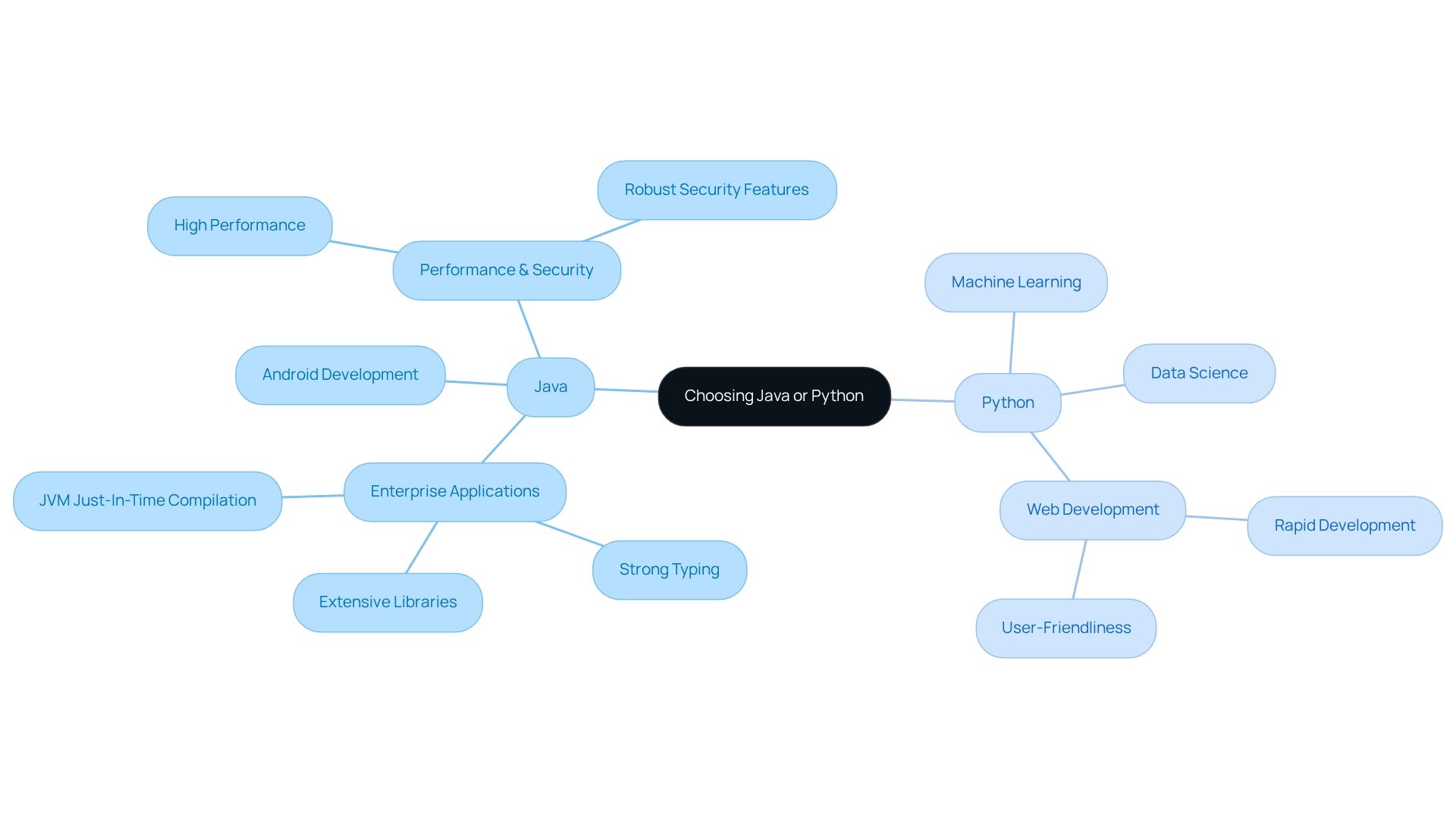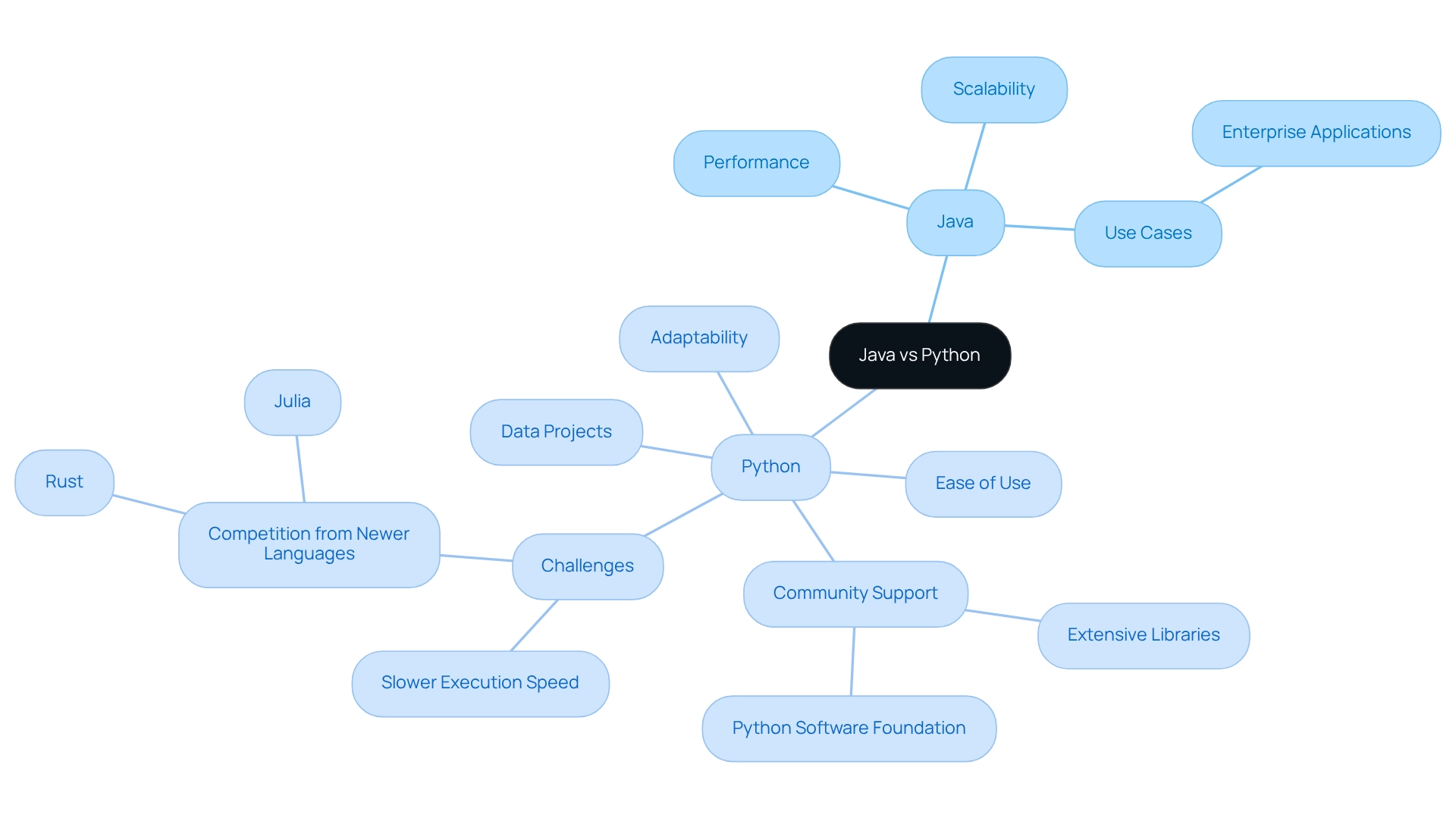Overview
In the realm of software development, developers often grapple with the challenges of choosing the right programming language. This article compares Java and Python, examining their features, use cases, and the contexts in which each language excels.
While both languages share foundational coding principles, Java is particularly well-suited for enterprise applications that demand performance and scalability. In contrast, Python shines in rapid development and data-centric projects.
This comparison illustrates the respective strengths of each language and their appropriate applications, guiding developers toward informed decisions in their coding endeavors.
Introduction
In the ever-evolving landscape of programming languages, developers often grapple with the challenge of selecting the right tool for their projects. Java and Python emerge as two of the most influential and widely used options today, each offering unique strengths that cater to different needs.
Java emphasizes performance and scalability, making it a preferred choice for enterprise-level applications. In contrast, Python's simplicity and versatility are ideal for rapid development and data-driven initiatives.
As developers navigate these complexities, understanding the core concepts, performance metrics, and ideal use cases of Java and Python becomes crucial.
This article delves into the fundamental differences and similarities between these two powerhouse languages, providing insights that can guide developers in making informed decisions for their projects.
Overview of Java and Python: Core Concepts and Characteristics
Developers often face significant coding challenges that can hinder productivity. Fortunately, tools like Kodezi CLI are designed to simplify the development process for both JavaScript and Python developers. With features such as automated code debugging and the unique 'AutoHeal' capability, Kodezi allows teams to instantly identify and fix codebase issues. This ensures adherence to security best practices and coding standards, optimizing performance and enhancing overall code quality.
Kodezi serves as a 'Swiss-Army Knife' for programmers, offering adaptable solutions that cater to various coding challenges. Imagine being able to manage complex projects with ease, knowing that you have a tool that streamlines your workflow. By leveraging Kodezi, developers can significantly improve their productivity and the quality of their code.
The Virtual Machine (JVM) plays a vital role in enhancing performance through just-in-time compilation. It optimizes commonly used code and ensures efficient execution across platforms. As emphasized in the case study titled 'The Role of the Virtual Machine (JVM),' the JVM acts as an essential intermediary between code and computer hardware, enabling the execution of programs across different platforms. This capability highlights the portability of the language, allowing developers to write code once and execute it anywhere—an essential trait in today's varied computing environments. In summary, while this programming language and another popular one lead to the question of whether 'is java like python', they share foundational coding principles, but their unique attributes serve different development requirements and preferences. By utilizing tools like Kodezi, developers can further enhance these languages' capabilities, making them even more effective for specific applications. Why not explore Kodezi today and experience firsthand how it can elevate your programming productivity?

Feature Comparison: Syntax, Performance, and Usability
Coding can often present significant challenges for developers, particularly when it comes to managing verbosity and clarity in syntax. The programming language's syntax is marked by its verbosity, requiring explicit declarations and the use of semicolons. While this can lead to longer code, it ultimately enhances clarity, especially in large applications. In contrast, another language utilizes indentation to define code blocks, resulting in a cleaner and more readable structure. Furthermore, in terms of performance, the compiled nature of this language generally outperforms its counterpart, enabling runtime optimizations.
As developers seek to improve their productivity, Kodezi emerges as a solution that addresses these challenges effectively. With user-friendly syntax and quick prototyping features, Kodezi stands out as the preferred choice for tasks that emphasize development speed. Its extensive libraries and frameworks cater to complex applications, while its rich ecosystem excels in data analysis and machine learning. This versatility allows developers to choose the appropriate tools based on project requirements and their own expertise.
Notably, as the computing industry evolves, performance benchmarks for both languages are continually scrutinized. Experts have observed that while both can handle similar tasks, their performance and tooling differ significantly. This ongoing evolution underscores the importance of selecting the right language for specific projects. As Grady Booch suggests, the computing industry has transformed the world in essentially one generation, highlighting the significance of programming languages in this landscape.
Additionally, Kodezi boosts programmer productivity through automated code debugging, enabling teams to quickly identify and resolve issues, enhance performance, and maintain security compliance. The Kodezi CLI serves as a versatile tool for teams, facilitating effortless deployment and automation of code reviews and API documentation. Ultimately, Kodezi supports developers in maintaining code quality and efficiency.
Have you considered how Kodezi could streamline your coding practices? Explore the tools available on the platform and discover how they can enhance your development experience.

Use Cases: When to Choose Java or Python for Your Project
Developers often face significant challenges when navigating the complexities of programming languages, particularly when it comes to choosing the right one for their projects. This programming language is frequently the favored option for large-scale enterprise applications, Android development, and systems that emphasize high performance and security. Its strong typing and extensive libraries make it ideal for complex projects that require reliability and maintainability. Furthermore, cloud platforms like AWS and Azure provide robust support for scaling Java applications, further emphasizing its suitability for enterprise environments.
In addition, this programming language excels in fields like data science, machine learning, and web development, where quick development and user-friendliness are essential. It is predominantly utilized for web applications and scripting, rendering it especially preferred for projects that require rapid iterations. For instance, startups frequently choose a dynamic programming language when creating minimum viable products (MVPs) because of its speed and adaptability. Conversely, established firms usually prefer a more traditional language for their core systems, gaining advantages from its strong architecture and scalability.
The JVM's just-in-time compilation also enhances the performance of the language by converting frequently used bytecode into machine code, making it even more efficient for enterprise applications. As of 2025, the selection between the programming languages primarily relies on the particular needs of the endeavor. The latter is often the preferred option for data-centric initiatives, while the former remains robust in enterprise-level applications.
As noted, 'Both languages are similar programming languages with a lot of resemblances as well as distinctions, leading to the inquiry of is java like python,' which reflects the nuanced preferences programmers have based on their project requirements. Moreover, the variations in programming style, as emphasized in the case study 'Programming Language A vs Programming Language B Syntax and Coding Style,' affect these decisions. Some developers favor the latter for its simplicity and clarity, while others appreciate the former's organized method. How do you choose the right programming language for your next project?

Conclusion: Evaluating Java and Python for Development Needs
Both programming languages present unique advantages tailored to specific development needs. One language stands out for its performance and scalability, making it the preferred option for enterprise-level applications where reliability and speed are essential. Conversely, the other language’s ease of use and adaptability support rapid development cycles and data-focused projects, allowing developers to prototype and iterate quickly.
Assessing project requirements is crucial. For instance, an initiative that demands high concurrency and robust architecture might lean towards one language, while projects centered on data analysis or machine learning could benefit from the extensive libraries and community support offered by the other.
Statistics indicate that projects utilizing the alternative language frequently report higher success rates in large-scale implementations. For example, South African web developers, who rank among the highest earners in Africa with an average hourly rate of $19.85, exemplify the financial considerations in choosing between languages based on success and compensation. Additionally, the simplicity of this language leads to elevated developer satisfaction ratings, particularly among professionals engaged in data science and web development. However, it is important to recognize the hurdles faced by developers using this language, such as its slower execution speed relative to compiled languages and competition from newer languages like Rust and Julia. Despite these challenges, Python's extensive community and rich libraries uphold its popularity and versatility in the programming realm, leading many to ask, is Java like Python in terms of functionality? Ultimately, the choice between Java and Python should be guided by the specific demands of the project, the expertise of the development team, and the long-term goals of the application. This ensures that the selected language aligns with both immediate and future objectives.

Conclusion
In the ever-evolving programming landscape, developers often encounter significant coding challenges. These hurdles can impede productivity and hinder the success of projects. However, Kodezi emerges as a solution, addressing these issues with a suite of powerful features designed to streamline the development process.
Kodezi offers tools that simplify code management, enhance collaboration, and improve overall efficiency. For instance, its intuitive interface allows developers to easily navigate complex codebases, while real-time collaboration features facilitate seamless teamwork. Furthermore, the platform’s integration capabilities ensure that developers can work within their preferred environments without disruption.
The benefits of using Kodezi are substantial. By leveraging its features, developers can significantly improve productivity and code quality, allowing for quicker iterations and more robust applications. Imagine reducing the time spent on debugging and enhancing your project’s overall performance—all while enjoying a user-friendly experience.
Ultimately, exploring the tools available on Kodezi can empower developers to tackle their programming challenges effectively. Are you ready to elevate your coding practices? Discover how Kodezi can transform your development workflow and help you achieve your project goals with confidence.
Frequently Asked Questions
What challenges do developers face that can impact productivity?
Developers often encounter significant coding challenges that can hinder their productivity.
How does Kodezi CLI assist developers?
Kodezi CLI simplifies the development process for JavaScript and Python developers by offering features like automated code debugging and the unique 'AutoHeal' capability, which helps teams instantly identify and fix codebase issues.
What benefits does Kodezi provide in terms of code quality and performance?
Kodezi ensures adherence to security best practices and coding standards, optimizing performance and enhancing overall code quality.
How is Kodezi described in terms of its functionality for programmers?
Kodezi is likened to a 'Swiss-Army Knife' for programmers, providing adaptable solutions that address various coding challenges and streamline workflow.
What role does the Virtual Machine (JVM) play in programming?
The JVM enhances performance through just-in-time compilation, optimizing commonly used code and ensuring efficient execution across different platforms.
Why is the portability of programming languages important?
The JVM acts as an intermediary between code and computer hardware, allowing developers to write code once and execute it anywhere, which is essential in today's varied computing environments.
Do Java and Python share similarities in coding principles?
Yes, while Java and Python share foundational coding principles, they have unique attributes that cater to different development requirements and preferences.
How can tools like Kodezi enhance the capabilities of Java and Python?
By utilizing tools like Kodezi, developers can further enhance the capabilities of Java and Python, making them more effective for specific applications.




